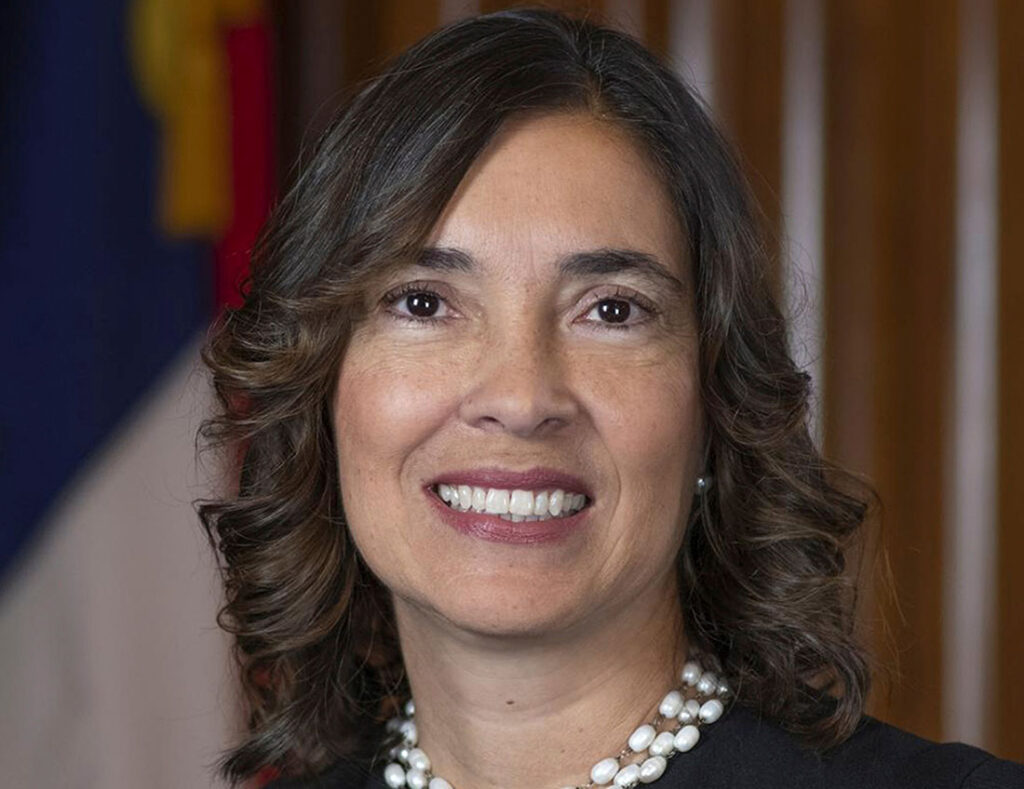A North Carolina Supreme Court justice filed a federal lawsuit on Tuesday against the state’s judicial ethics commission seeking to end an ongoing investigation into public statements she made about the lack of diversity in the state’s court system.
Associate Justice Anita Earls accused the North Carolina Judicial Standards Commission, a 14-member ethics panel that considers complaints of misconduct against the state’s top jurists, of attempting to silence her in violation of her First Amendment rights to discuss matters of public concern.
“The First Amendment allows Justice Earls to use her right to free speech to bring to light imperfections and unfairness in the judicial system,” the filing reads. “At the same time, the First Amendment prohibits the Commission from investigating and punishing her for doing so.”
She is seeking a declaration from the court that the “investigation and potential punishment … for her statements on matters of public concern” is unconstitutional as well as a permanent injunction “barring further investigation or punishment” for future statements.
In response to questions from First Amendment Watch, Brittany Pinkham, the commission’s executive director, issued a brief statement.
“The Commission is statutorily obligated to investigate all instances of alleged judicial misconduct,” she said, “and cannot comment on pending investigations.”
The ethics panel launched the probe, according to the complaint, in response to Earls’ comments in a June interview with the legal news service Law360, in which she was asked (as the only Black woman sitting on the state’s highest court) about a lack of diversity throughout the state’s court system.
The North Carolina Bar Association had recently released a report analyzing demographics of attorneys in the state and found that “by any measure, women and minority attorneys are starkly underrepresented among attorneys appearing at our state’s highest court.”
When asked to respond to those findings, Earls acknowledged some “implicit biases” in the court system.
“When the culture is that male advocates and advocates who reflect the majority of the court, white advocates, when they get more respect, when they are treated better,” she said, “I think it filters into people’s calculations about who should argue and who’s likely to get the best reception and who can be the most persuasive.”
“I’m not suggesting that any of this is conscious, intentional, racial animus,” she continued. “But I do think that our court system, like any other court system, is made up of human beings and I believe the research that shows that we all have implicit biases.”
According to the filing, in the commission’s subsequent notice to Justice Earls, the ethics panel said her “comments ‘appear to allege that your Supreme Court colleagues are acting out of racial, gender, and/or political bias in some of their decision-making.’” It prompted them to launch an investigation into whether those comments violated standards of judicial conduct mandating that a “judge should respect and comply with the law and should conduct himself/herself at all times in a manner that promotes public confidence in the integrity and impartiality of the judiciary.’”
Earls suggested in the complaint, however, that the commission’s actions were not reflective of that interest.
“The Commission’s actions in instituting the investigation indicate that it believes that ‘‘promot[ing] public confidence in the impartiality of the judiciary,’ is best accomplished by threatening judges who speak out about what they view as imperfections or defects in the judicial system and who do so in a measured and nuanced manner,” the filing reads. “Nothing could be more inimical to the First Amendment.”
Earls’ attorney, Pressly Millen, called the move “very problematic,” amounting to censorship masquerading as discipline.
“You can’t use these disciplinary rules to draw a cloak of secrecy around the court,” he said.
He pointed to some precedent. The complaint references the 1990 decision in Scott v. Flowers, in which the U.S. Court of Appeals for the Fifth Circuit ruled that the Texas Commission on Judicial Conduct was barred under the First Amendment from disciplining elected judicial officials for speech critical of the judiciary.
According to David Sachar, director of the Center for Judicial Ethics at the National Center for State Courts, a judge’s right to free speech and a judge’s duty to be perceived as fair and unbiased is “a common area of tension.”
“A judge is not entirely deprived of free speech rights just by virtue of their public service role,” Sachar said. “However, there are limitations such as avoiding speech that would cause frequent recusal, using discriminatory or hate speech, or commenting on pending and impending cases.”
It is important, he said, for judges to be involved in discussions of policy that affects the court system but wary of making public comments that could limit their participation in future cases.
“Even with speech that is anticipated by the Code – such as commenting in public forums on the improvement of the administration of justice – there can be a subsequent duty to recuse on cases,” Sachar said. “Permissible comments can still lead to a judge being asked to disqualify and consider the appearance of bias in a case where those same issues arise.”
Tags




